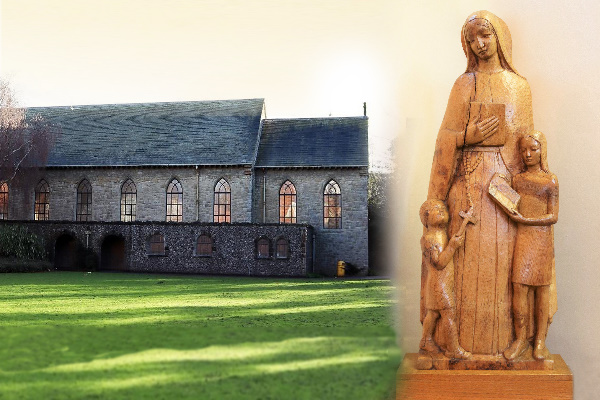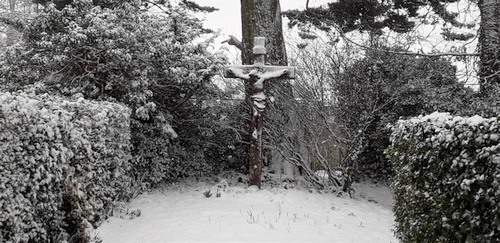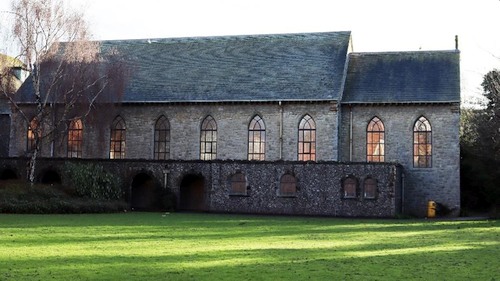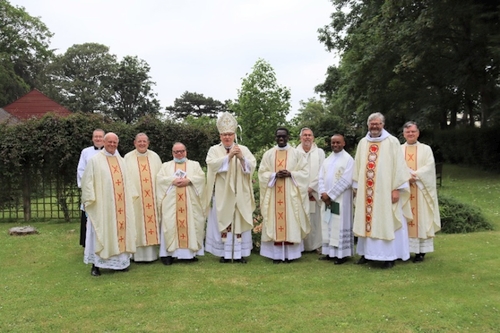Thanksgiving in Westgate, England
12/01/2022

On the 9th July, 2021, the Ursulines of the English Province gathered to concelebrate a Mass of thanksgiving for the 117 years of prayerful Ursuline presence and dedication to education in Westgate-On-Sea.
After much prayer and reflection, it was decided to bring the communities closer together in London and to move from the Westgate site. We accompany the sisters in these transformations and give thanks for the many good things that have taken place thanks to their contribution.
Ursuline Convent, Westgate-On-Sea, England
1904-2021
“How different it must have been for those first sisters who came in 1904 from Boulogne-sur-Mer. Immediately they began to educate, a process which continues today. A process which will stretch into the future through the legacy given by those holy women, by you my dear sisters and those who have gone before you. On behalf of our Archdiocese I want to express my sincere gratitude for your presence, for your service, for your witness.” – Archbishop John Wilson, Thanksgiving Mass, July 9th 2021.
Many Ursuline convents in England were founded by communities who came from France and Germany seeking refuge from persecution. It was an alarming event in France in 1904 that began the Westgate story.
The Combes Law which suppressed all the religious teaching congregations in France led to a sad and painful departure from Boulogne for the Ursuline Sisters in August 1904. As the sisters boarded their boat to Margate, a cry of ‘Vivent les Soeurs” rang out from a group of former parents, pupils and friends that had come to say their goodbyes. A 22-year exile was to begin for this small group of French Ursulines - the true founders of the Westgate convent.
In Westgate, the Ursulines settled as best they could but were reluctant to build anything permanent as they were hoping for a short stay in England. They rented four houses in Adrian Square where the best room was reserved for the chapel; other rooms were used as dormitories and classrooms, and the sisters shared the smallest rooms. After a couple of years, it was clear that their exile was to be longer than hoped and they needed to look for a bigger property. Hatton House had recently been built; it was near the sea, surrounded by sheep grazing in fields and with extensive grounds, It immediately caught the eye of the sisters. Priced at £8,000 (a great deal of money in 1906) two beneficiaries provided the funds and the Ursulines were able to realise their dream of owning this beautiful property, with its spacious lawns and tree-lined avenues. It is still as beautiful today as it was then.
One notable part of the garden is the Calvary Walk. Quoting from the early ‘Annales’ of the French nuns, it reads ‘the bushes were filled with nests: thrushes, blackbirds, hedge sparrows and chaffinches were all in their seventh heaven!’ The avian great, great, great grandchildren of these birds are still chirping in the garden today.

The next chapter in the Westgate story came in 1907, when the first stone of the convent was laid and a year later the sisters had their own building. The red brick property conformed to monastic requirements of the time, with separate cells and a community room with French windows opening out onto the lawn.
It is not surprising that although the French sisters had made a home and established a successful school in Westgate, they longed to return to their motherland. However, this was to be delayed by the outbreak of the First World War. When the end of the war was announced in 1918 by the ringing of the bells in nearby Quex Park, it would still take the sisters eight more years to return to home. In 1926, the founding Ursuline Sisters of Westgate departed for France and eight Ursulines from a convent in Bideford, Devon, led by Mother Francis Lemarchand, stepped in to replace them. Over the years, Westgate became a truly English Ursuline house. The site was developed, buildings added, the school extended and the number of Ursulines and students increased.
In 1938 the chapel and cloisters were built. Since its construction, the chapel has been treasured by Ursulines and pupils throughout the decades, for its dignified beauty, its spaciousness and its simple carved statues.

In September 1939 war was declared and due to Westgate’s close proximity to the coast it became clear that it was no longer safe, so the school and convent were evacuated to the countryside of Berkshire. A large country house was rented: Rush Court, Wallingford. The community and school stayed there for the remainder of the war. The sisters showed the same courage and determination that their French founders had shown. Both fled for safety, and both remained devoted to continuing Ursuline education, despite the uncertainty and difficulties that lay ahead. As for the land and buildings they had left behind, they were used by the Women’s Auxiliary Air Force. In 1945 when war was over, the sisters and students returned to Westgate. The post war years were far from easy, but with the hard work and dedication of the Ursuline sisters, the school went from strength to strength.
As the years passed the school continued to grow and change by responding to the needs of the times. Today it is a successful co-educational school and part of the diocese of Southwark’s provision for all children in the area. The Ursuline sisters led the school until 2007. Since then, dedicated lay staff have kept alive the Ursuline teaching tradition; both Ursulines and pupils owe them a great debt of gratitude.
In 1985 a small Care Home was built close to the convent. Lourdes, as it was called, became the home of Sr. Francis Lemarchand, who had arrived in 1926 from Bideford to replace the departing French sisters. Three days after her arrival at Lourdes she said “I am very happy and love this place. It is so wonderfully good of God to have given me for my last few years, this little bit of contemplative life that I have always longed for”. A great number of sisters have been cared for in Lourdes for nearly forty years.
Like all Ursulines the sisters in England have been discerning their future. After much prayer and reflection, it was decided to bring the communities closer together in London and to close our Westgate home.
On the 9th July, 2021, the Ursulines of the English Province gathered in the beautiful chapel to welcome Archbishop John Wilson to concelebrate, with ten other priests, a Mass of thanksgiving for the 117 years of prayerful Ursuline presence and dedication to education. During his sermon the Archbishop spoke fondly and with great gratitude to the Ursuline community:
“Steeped in the witness of these two saints, it is fidelity to Christ and service to the Church’s mission through education, which we celebrate today, in you, and your predecessors, who have sustained the Ursuline presence, here in Westgate for the past 117 years. What an incredible achievement, only possible because of the Lord’s call, the Lord’s choice, that we, that you, bear fruit that will last.”
His final thoughts were about St Angela
“When it came to speaking about the Christian life, she was refreshingly straight forward: ‘‘Strive to be faithful to that which God has called you’, she said. ‘Do now what you wish to have done when your moment comes to die.’ ‘Do something, get moving, risk new things, stick with it, get on your knees, then be ready for big surprises.’ This is timeless good advice for every disciple.”

We pray that the spirit of St. Angela will continue to live on in the hearts of our many students, past and present, in our staff, in our friends, and all those we have known in the area. We rejoice that the school we are leaving behind will continue to educate young people who will go out into the world with strong Christian principles always conscious of their responsibility to strive for peace, justice and the integrity of creation. May St. Angela continue to inspire all of us, with her love of God, her generous spirit and her kindness.
Elizabeth Durrant and Ursulines
